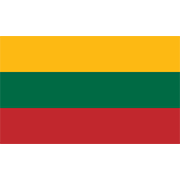Fiscal subject related
Lithuania’s Seimas has approved changes to the country’s VAT system as part of a broader tax reform package aimed at bolstering defense funding. Beginning January 1, 2026, the country will introduce two new reduced VAT rates—5% and 12%—alongside a significant rollback of existing exemptions.
Passed with 77 votes in favor, 19 against, and 16 abstentions, the amendments to Lithuania’s VAT Law will lower the rate on books and non-periodical publications from the current 9% to 5%. In contrast, VAT on accommodation services, passenger transport, and arts and cultural events will rise to 12%.
However, not all sectors will benefit from the revised structure. District heating, hot water supply, and firewood—currently taxed at the reduced 9% rate—will revert to the standard 21% rate as the exemption is abolished. The minister of finance defended the decision, stating that the exemption was “inappropriate” and did not address any specific social concern.
To ease the impact of this change, the government plans to raise the asset thresholds for heating and utility-related compensation programs, ensuring that vulnerable households continue to receive targeted support.
Other news from Lithuania
Sweetened drinks tax starting January 2026 in Lithuania
 Lithuania
Author: Nikolina Basić
Lithuania
Author: Nikolina Basić
Lithuania will introduce a new excise tax on sweetened non-alcoholic beverages starting January 1, 2026, targeting drinks with added sugars or sweeteners while exempting those with only natural sugars. The measure, part of the 2026 tax reform, sets tiered rates up to €21 per hectolitre and is expected to slightly raise retail prices depending on sugar content and product type. The Lithuanian Parli... Read more



Lithuania updates VAT Law with new reduced rates and exemptions
 Lithuania
Author: Nikolina Basić
Lithuania
Author: Nikolina Basić
Lithuania has proposed amendments to its VAT law introducing a 12% reduced rate for accommodation, public transport, cultural visits, and household energy supplies. The draft also extends reduced VAT to printed and electronic books and educational publications, excluding those with mainly advertising, music, or video content Lithuania has amended its Value Added Tax (VAT) law to introduce new redu... Read more



New technical documentation in Lithuania
 Lithuania
Author: Ištvan Božoki
Lithuania
Author: Ištvan Božoki
The Lithuanian Tax Authority has released version 1.9 of its technical documentation, introducing clarifications to several web services, including updates to the description of “linkedDocumentNumber” and the error code CERTIFICATE_VALID_TOO_LONG. Changes also affect the validity descriptions of transport and security module certificates in the CSR file creation guide, with the full documentatio... Read more



Lithuania begins shift toward EU-compliant Structured E-Invoicing
 Lithuania
Author: Nikolina Basić
Lithuania
Author: Nikolina Basić
Lithuania plans to implement nationwide structured e-invoicing by 2028, using the EU standard EN 16931 and aligning with the 2030 VAT in the Digital Age reforms. The system will likely adopt a 5-corner model with real-time reporting to the SABIS platform, building on its existing eSąskaita B2G infrastructure and offering free API-based tools for businesses. Lithuania has set its sights on a full-s... Read more



New document was uploaded: EV-chargers from the Fiscalization Perspective in Lithuania
 Lithuania
Author: Nikolina Basić
Lithuania
Author: Nikolina Basić
The purpose of this document is to explain rules regarding the treatment of EV chargers for electric vehicles from a fiscalization perspective. We will explain whether EV chargers need to contain cash registers and other fiscal requirements or not, is it maybe part of the e-invoicing rules, or are they exempt from those obligations? Read more
Subscribe to get access to the latest news, documents, webinars and educations.
Already subscriber? Login


Lithuania introduces the Tax sweetened beverages starting January 2026.
 Lithuania
Author: Nikolina Basić
Lithuania
Author: Nikolina Basić
Starting January 2026, Lithuania will introduce excise duties on sweetened beverages, including soft drinks, flavored waters, and concentrates with added sugar or sweeteners, under Law No. XV-286. The tax applies to both domestic production and imports for business use, with exemptions for medical products, infant formula, and non-packaged drinks from restaurants or cafes. The Lithuanian governmen... Read more


